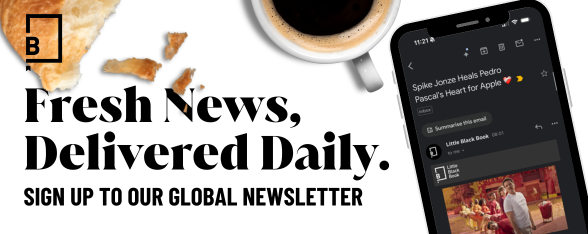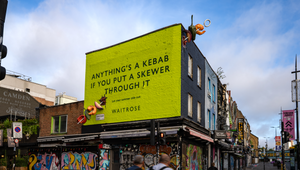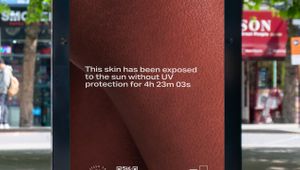
Best Foot Forward: The Not-So-Smooth Origin Story of Wonderhood Studios

Times have been hard for many businesses recently, but when the pandemic hit the UK in March 2020, the founders of Wonderhood Studios were well aware that it might spell doom for their fledgling business. “We were on such a high momentum-wise and you could feel it in the office. Then suddenly the doors had to shut,” says Alex Best, founder and chief operating officer. The creative shop had set out its stall late in 2018 and the team were just beginning to taste the fruits of their labour. “It was very stressful,” he says.
The account manager of the trio, Alex had never worked at a startup before. His background was in big, established agencies like HHCL in the ‘90s (of Tango Orange Man fame), working on TBWA's iconic PlayStation account, Cadbury’s at Fallon, then Nike and Tesco at Wieden+Kennedy London. Before Wonderhood he was a partner at The&Partnership.
His fellow founders have equally impressive CVs. Jessica Lovell, chief strategic officer, had worked at St Luke’s, Mother - where she helped bring back the PG Tips monkey, introduced the world to the Orange Film Board and contributed to the cultural touchstone that was Boots’ Here Come the Girls. In her time at adam&eveDDB she’d worked on strategy for Harvey Nichols and Skittles, as well as being accountable for the strategic output across the whole agency client base.
Aidan McClure, Wonderhood’s chief creative officer, worked in similar places on his way up. He started at Mother on while Jessica was there. “I remember her, but I don’t think she remembered me - the snotty placement kid in the corner,” he laughs. He cut his teeth there and at AMV BBDO before heading to adam&eve before the DDB merger - when there were only 30 or so staff (which gives him the most solid startup experience of the three). Later he co-founded BBC Creative - the corporation’s in-house creative agency with a remit to help reinvent the BBC for the next generation. Within two years BBC Creative was responsible for all of the BBC’s multi-channel marketing output, totalling over 1,200 campaigns a year.
Alex, Jessica and Aidan had been assembled, Avengers-style, by CEO David Abraham, united over their belief that creativity is the fuel that will help to grow ambitious brands and get them talked about - a belief that shines through each of their track records before Wonderhood Studios. And the first work the agency made together demonstrated where they wanted to head.
Their heartbreaking film for charity and British cultural institution Comic Relief was a clear statement of intent - a chance to demonstrate their strategic, creative and craft chops. “When you're starting a business, you have opportunities that you make money from to keep the doors open and then opportunities that put you on the map creatively and give you a chance to flex your wings,” says Aidan. “Comic Relief is definitely one of those.”
They had an idea that a completely serious film would be an interesting, almost counterintuitive approach for Comic Relief. In response to a client brief to thank the nation for 30 years of support, the performance-led film was a portrait of contemporary humanity that resonated across the UK. “It was one of those projects that just sort of fell into place,” says Aidan, praising the directors thirtytwo for their direction, for which they won a “really well deserved” D&AD pencil. “They really poured their heart and soul into it and shot it all on film.”
A passion for craft began to emerge as a theme when Wonderhood Studios launched another campaign at the end of 2019 for Nike, standing against racism in football by celebrating the 93 Black players who had played for the England men’s football team to date. Other than the important spirit of protest at the heart of the idea, the design touches made the project feel extra special. 93 typefaces were designed to reflect the debut shirts of each one of those players. “There are all sorts of little touches in there which probably a lot of people wouldn't notice,” says Aidan, “But the project itself just has a feeling of craft about it.”
Knowing that in a startup you have to make your own opportunities, Aidan sees Nike as a great example of proactively showing what you can do. Wonderhood took the idea to the client proactively and it grew to the point where the campaign was a full takeover of Wembley Stadium, plus out-of-home, press and social.
Both these pieces of work received plenty of industry recognition and entering 2020, the agency felt they’d created a shop window they were happy to let clients peruse. It was pitching season. Winning Starling Bank was a big moment, representing the first sustained, non project-based piece of business they’d won. As Jessica says, Starling is a “big, solid client” that they knew they wanted to begin a long-term relationship with.
They were about to start production on their first campaign for the bank when the world began to hear rumblings of the outbreak of a virus in China. They were a small team, pitching hard and about to move into shiny new offices with room to grow.
In February 2020 the pitching mode they were in paid off again when Wonderhood won Mizkan Europe, home of iconic British brands Branston Pickle and Sarson’s Vinegar.
There was a good energy around the company.
The agency’s respect for craft continued to shine through in its multi-platform campaign for Starling Bank, which launched at the end of February, conveying the emotional truth of how it feels to run a new business through the madcap metaphor of a rickety shed flying through the sky. Aidan’s words on the launch definitely evoked the startup experience Wonderhood was going through at the time: “For anyone who’s started their own business they’ll recognise that feeling of plummeting towards certain ruin before turning on a dime and soaring through the clouds. This campaign has been lovingly crafted for those heroes.”
Feeling that they were just getting airborne, the team moved in and set up home in the new Wonderhood Studios space. They were in their new home for seven days before lockdown hit the industry and the Wonderhood team.
Winning new business was still crucial to keep the engines running. “We felt we had all this energy, we were all ready to go and then lockdown hit, and the new business pipeline just dropped off,” says Alex. Plummeting towards their ruin didn’t seem out of the question at this point.
They were definitely about to enter one hell of a ride with a lot at stake for an impassioned agency team, their families and a new business dependant on growth. But they had a commitment to make it work. “You could deal with this one of two ways,” says Jessica. “You can go out there and put your best foot forward and make it happen, or you can close in, panic and worry about it. Our attitude was to hit the phones, reach out to people, make it happen, but it was a real moment in time where there was a decision to be made about how you face something.”
While the Starling Bank work was made pre-pandemic, it was also fortunately quite Covid-proof. The business campaign had already featured somebody working from home, so that footage was able to be repositioned for the retail bank with a quick re-edit.
Then came a moment that Aidan says was the “most agency-defining” event - they lost a pitch. The whole process had taken place on Teams, so Wonderhood never met the client. “In many ways it was an absolute blessing because it wasn't a very big client that we were pitching for, but it was a really valuable lesson on how to do it.” They didn’t mope. Aidan recalls how they worked out “forensically” why they didn’t win and what to do next time.
Next time, it turns out, was the pitch for the sizable Three UK telco account - a virtual shoot-out against formidable competition from Mother and Uncommon. “At the time, it was really gutting when we lost that pitch because it felt like we were never going to get new business ever again. And then Three came along three weeks later. Actually, the timing of it was really good because we went into that knowing what we were doing, learning from our mistakes. I think probably we were one of the few companies that had actually already done a pitch completely on video calls before. We had practice on that.”
They won their account - a massive deal for an agency still in its infancy - and immediately set to work creating their first campaign in eight weeks during the second UK lockdown, a stepping-stone towards a completely new brand platform.
Jessica reflects on the strategy that she believes won the pitch: “We really got their ambition for the brand at that moment in time. It was appropriate for the brand to come of age. It had been around for 18 years and had kind of been the fun one in the corner. They needed to prove themselves, to show their substance. And doing it in a way that has brilliant insight at the heart of it.”
While all of this was going on, the Wonderhood original programming studio has made several broadcast shows for BBC, Channel4, ITV, Channel 5 and Smithsonian including Trump in Tweets, which has been put forward for a BAFTA nomination and the recent Baby Surgeons for Channel 4.
The original programming studio is mostly factual in its output so far, but Jessica hints that they have every intention to invest in other genres soon.
As an agency that takes strategy seriously, Wonderhood has been strengthening its data insight offering, helping to connect clients and their creatives to the real world, giving them real-time insight into how audiences are feeling and behaving.
By the end of 2020, Wonderhood was soaring, launching a new long-term brand platform for Branston with their first campaign produced during the second lockdown, and beautifully directed by BAFTA-nominated director Charlotte Regan. Strategic insight into people’s real emotional connections to brands continued to shine through, highlighting the chunky British pickle’s ability to transport people home.
Around the same time the agency launched a documentary and promotional comms for the supermarket Waitrose, pioneering a new communication model they call ‘Branded Original Programming’. ‘Summer on the Farm: An Extraordinary Year’ features Alan Titchmarsh, Angellica Bell and Amanda Owen reporting on the state of Britain's farms during peak harvest. The programme examines the journey a single fruit or vegetable has to take from farm to shop, and looks at how farmers are coping with a reduced workforce, soaring demand and extreme weather. Reaching a broadcast audience of 3.5m people, the aim was to engage them around the Waitrose brand’s values. There’s plenty more in the work to come in 2021 in this “Venn space”, as Jessica calls it, between advertising and programming.
Wonderhood finished 2020 having doubled its turnover. And all against a global backdrop of uncertainty and constantly moving parts.
2021 started with a campaign for apple cider vinegar brand OSU - all cast and shot remotely in Japan in lockdown - as well as two new pieces of work for Three (Three x Gogglebox - Wherever, Whenever, However and Three X Sarmatians - #BetterPhoneFriend).
The pitch wins continued, with fintech brand SumUp and then Motorway - a new online disrupter brand with CMO Lloyd Page (formerly of MoneySuperMarket) - coming on board.
That first big, solid client relationship with Starling Bank endured and the agency’s work has helped them become the fastest growing European SME bank, achieving more downloads than Monzo.
Through the pandemic the founders have staunchly protected a company culture that they’d started to carve out back in the office-working age, ensuring they looked out for each other, met for socially distanced drinks in the park, played virtual bingo and made virtual cocktails. They have also stopped all non-urgent emails before 8am and after 7pm and ensured space for everyone to have a lunch break away from the screen.
This stems from a belief of the trio that, as Alex puts it: “Surely we can make some really brilliant creative work and have a culture where we're not killing people. Our vision is real ambition without burning people out and making it a painful experience.”
The agency now represents 40 ‘Wonderhoodlums’ and 16 brands, and a few weeks ago saw the biggest campaign to come from this team so far - Three’s new brand platform, campaign and visual identity, ‘Life Needs a Big Network’.
Working across all touchpoints from TV to instore, digital, social and OOH, the work captures life with all its quirks and idiosyncrasies. It shows how Three is perfectly placed to help its customers with both the big but also the smaller things in life
The earlier campaigns were just a taste of what Wonderhood wanted to do for Three. Since the win in 2020 the team has been working on this hefty project - a chance for the agency to cement itself as a serious creative force. “It was a really fascinating brief - a proper brand transformation,” says Alex. “It’s very different to where they've been.”
Data is woven into the creative, explains Aidan. “What we've done is take all those little mobile insights - the way people genuinely use their phones - and show how you've got the big stuff (like 5G investment), but actually what's really important is the small stuff that you use your phone every day to do.”
It’s human, it’s rooted in insight and it’s a completely new direction for the mobile network, with beautiful posters that are “inspired by social” and as Aidan puts it, traditional media that’s “of the internet”.

There’s even a new brand colour. While many of the British telcos take up key points on the spectrum, Wonderhood have found Three a shade that evokes a sunrise. “It fits with the idea of a new dawn,” says Aidan.
In 2021, it feels like so many parts of the world and industry are in need of a new dawn. Maybe Wonderhood Studios is just rising to show ad agencies what the future of creativity could look like.















